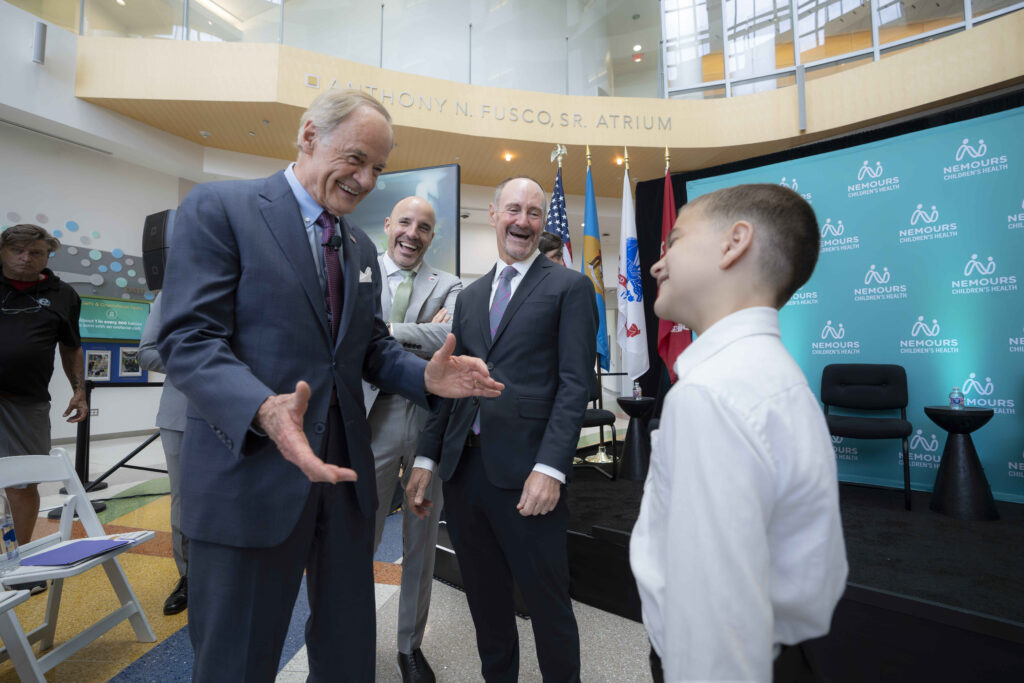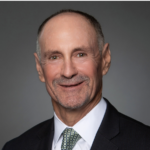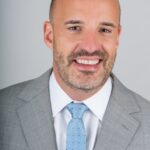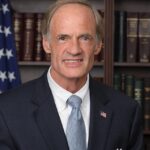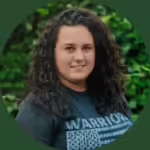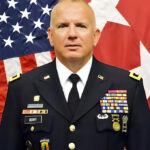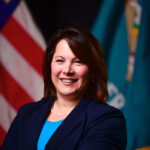In 2021, the Elizabeth Dole Foundation (EDF) released a study indicating that roughly 2.3 million children across the U.S. serve as primary or secondary caregivers to family members wounded, injured or ill due to their service in the U.S. military. They are our nation’s hidden helpers.
To better support these children, EDF partnered with the Wounded Warrior Project and the White House’s Joining Forces Initiative, led by First Lady Dr. Jill Biden, to create the Hidden Helpers Coalition. The coalition comprises over 100 partner organizations, including government agencies, non-profits like Nemours Children’s Health, and private sector entities.
To highlight coalition efforts over the last three years and announce new commitments, Nemours Children’s, the Office of United States Senator Tom Carper (D-DE) and EDF held a forum at Nemours Children’s Hospital, Delaware, entitled “Supporting Our Military Families and Hidden Helpers.” This podcast is the first of a two-part episode featuring event highlights.
Guests:
R. Lawrence Moss, MD, President and CEO, Nemours Children’s Health
Steve Schwab, CEO, Elizabeth Dole Foundation
Tom Carper, U.S. Senator, D-Delaware
Silvia Lopez, Elizabeth Dole Foundation Fellow and military wife
Major General Michael R. Berry, Adjutant General, Delaware National Guard
Josette Manning, Cabinet Secretary, Delaware Department of Health and Social Services and Veteran wife
Steve E. Yeatman, Cabinet Secretary, Delaware Department of Services for Children, Youth and Their Families and Veteran
Amanda Brady, BSN, RN, MBA, CPN, CRCR, ACM-RN, Nemours Children’s Health and Military Family
Thomas Brady, Hidden Helper
Host/Producer: Carol Vassar
TRANSCRIPT
Steve Schwab, CEO, Elizabeth Dole Foundation:
About two and a half years ago, the Elizabeth Dole Foundation approached my team about partnering to enhance the health of children who are part of military caregiving families. It was an easy conversation. Today, our collaboration recognizes the unique needs of military families by supporting community-based providers in caring for the 2.3 million children who are part of military caregiving families. Veterans can’t thrive without strong families.
Carol Vassar, podcast host/producer:
That’s Steve Schwab, CEO of the Elizabeth Dole Foundation. Before that, we heard from Dr. Larry Moss, President & CEO of Nemours Children’s Health, both talking about the critical role our nation’s hidden helpers play in their military families. Who are our nation’s hidden helpers? According to the Elizabeth Dole Foundation or EDF, they are the 2.3 million children across the US, referenced by Dr. Moss, serving as either primary or secondary caregivers to family members, wounded, injured, or ill because of their service in the U.S. military.
In 2021 to better support these children, EDF partnered with the Wounded Warrior Project and the White House Joining Forces Initiative led by First Lady Dr. Jill Biden to create the Hidden Helpers Coalition comprised of over 100 partner organizations, including Nemours Children’s and Hidden Helpers themselves.
To highlight coalition efforts over the last three years and announce new commitments. Nemours, along with the office of US Senator Tom Carper and EDF, held a forum at Nemours Children’s Hospital, Delaware, entitled Supporting Our Military Families and Hidden Helpers, which I had the honor of moderating. This podcast is the first of a two-part episode featuring highlights of the event.
During that forum, we heard the voices and stories of representatives of coalition member organizations and Hidden Helpers like Delaware Resident and Elizabeth Dole Foundation fellow Silvia Lopez.
Silvia Lopez, Elizabeth Dole Foundation Fellow and military wife:
Hello, my name is Silvia Lopez. I live here in Delaware with my husband Alex, our five children, and one grandchild. My husband served as a mortuary affairs specialist in the US Army and Army Reserve for 15 and a half years. He deployed around the world helping recovering remains of our fallen service members.
As you can imagine, his job, it was very difficult. Alex now suffers from severe PTSD and depression. He also has a traumatic brain injury that makes it hard for him to make decisions, as well as chronic balance issues that keep him for bending over safely, and he has skin conditions for his exposure to chemicals.
Being a caregiver is extremely stressful. Alex needs my assistance 24 hours a day. I help him deal with his emotional and physical pain and assist him with nearly every daily task, from showering and dressing to preparing and managing his medications. The experience has been very stressful and hard on us both, though our biggest concern, just like every other caregiver who is a parent, is the effect the situation has in our children. Unfortunately, there is no way for me to protect my children from the stress and responsibility of caring for their dad. Sometimes I feel very guilty on how hard is on them, but this is our reality as a military family.
When one of my children was six years old, she suffered terrible migraines. Our doctors could not find out what was wrong with her. Her pain continue until we finally connected the migraines to the stress that she was experiencing at home. Doctors rarely think of young kids as having so much stress in their life, and children have a hard time explaining their anxiety, especially when it’s all that they know in their life. With a little more awareness, our doctor might have considered those circumstances soon and been able to provide maybe relief to my daughter faster.
We have similar challenges with schools, too. Several years ago, when there were a lot of bomb threats being called into schools, my husband became very upset and worried. He has seen the effect of bombs firsthand and did not allow our kids to go to school. As a result, we were informed that we were breaking truancy laws and I had to go to court to defend our family and explain our situation. The school lack of understanding made a very difficult situation much worse.
So, thank you again for everything you are doing today. Caregiver kids observe so much hard moments in their young life, but educating healthcare providers and schools about the experience, we can create a safety and understanding a space that help them deal and feel like carefree kids again. Thank you.
Carol Vassar, podcast host/producer:
With that, let’s turn to our first panel. It is such a privilege to sit here on stage with these gentlemen. It is my distinct honor to introduce our participants in this first portion of this first panel, Delaware’s distinguished senior Senator Tom Carper, who we’ve already heard from today, but we have more to hear from him, and also Major General Michael R. Berry. Major General Berry assumed the duties as the Adjutant General of the Delaware National Guard on March 1st, 2019. In that role, he is responsible for the mission readiness of all Delaware National Guard units for federal and state missions. That includes overseeing 1500 soldiers and 1100 airmen. Thank you both for being here. Senator Carper?
United States Senator Tom Carper (D-DE), veteran:
Yes, ma’am.
Carol Vassar, podcast host/producer:
You have a very unique perspective on today’s discussion. You outlined that in your opening remarks. You’ve served our country in the military. You have served our country in public service, in politics, here in the State of Delaware, in the Congress, in the US Senate.
United States Senator Tom Carper (D-DE), veteran:
I must be old.
Carol Vassar, podcast host/producer:
Oh, stop. You’re seasoned. Can you reflect on some of your experiences in the military, in public service and share some of the approaches and the initiatives that have been effective in supporting military-involved families and their children?
United States Senator Tom Carper (D-DE), veteran:
Yeah, thanks for that. Again, thanks to everyone who’s joined us today and those who’ve worked to make this day possible. There’s a Republican in our state; his name’s Mike Castle. Anybody ever hear the name Mike Castle? Mike Castle was a lieutenant governor with Pete du Pont, and he was a governor for eight years. I’m a Democrat. He used to be the Commander-in-Chief in Delaware National Guard, which I was when I was governor. But people always thought we were going to run against each other, we’d have a big war and political battle. We never did that. We have something in Delaware called the Delaware Way, where we work together, we figure out how to work across party lines and get things done.
There’s a movie called Trading Places that some of you may remember from way, way back, and pretty funny movie. Mike Castle and I traded places. He had been the governor and was elected to Congress as our Congressional Seat US Rep. I was US Rep and I was elected governor and we traded places. And we were at a dinner just shortly after the election and just before he and I were sworn in, him as the Congressman, me as Governor of Delaware.
During the dinner, we had an emcee. The emcee asked a question for Mike Castle, incoming Congressman, outgoing Governor. He said, “What do you want to do, Mike Castle, as Congressman?” And he said to me, “What do you want to accomplish as Governor of the State of Delaware?” I don’t remember what Mike Castle said, but I remember what I said: “I want to spend however many days I’m privileged to be Governor of Delaware strengthening families. That’s what I want to focus on. I want to strengthen families. I want to make sure that children are brought into the world by families, by parents, moms and dads who understand their responsibilities and have a pretty good idea of how to get their child off to a healthy start and a good start in school.”
We had wellness centers in every high school and that sort of thing. The other thing that we did was we made sure that we had folks who were actually trained and able to work with kids and developmental issues and developmental problems. And found out what works, and we did more of that. What we did here in Delaware has now been used as a modeler. You hear every now and then we talk about gun legislation. When are we going to pass gun legislation? A year ago, we passed a gun legislation, and a Republican named Bill Cassidy, he’s from Louisiana, we go every Thursday a Bible study together, and we’re just good buddies and collaborators on a lot of stuff. We decided to take the idea of what we do in Delaware with wellness centers, the ability for kids to get services that they need literally in high schools and middle schools, and grade schools. The services are brought to where the kids are.
You don’t have to worry about how do you get the kids to where the services are offered. Sussex County, Delaware, is one of the biggest counties in America, and it’s kind of hard to get places. Anyway, we took the Delaware idea of bringing services to schools for kids, little kids, elementary, middle, high school, and we do that, and now we’re doing it across the country. And we allow schools, school districts, states to use the CHIP program, Children’s Health Insurance Program, and the Medicaid program to fund that. And they can use their state money as well, but the idea is to help make that possible. That’s just an example of the kind of stuff that we do. And it’s a Delaware idea. It’s like the Delaware way and we’re very proud of it and sharing it with the rest of the country.
At the end of the day, we need stronger families, and the last thing I’ll say is this. I said it before, it bears on saying again, or we have challenges in our country right now. We have challenges from all over the world as you know, but we have challenges in our country in recruiting and retaining men and women in the Army, Navy, Air Force, Marine Corps. And one of the best ways to make sure that we attract and retain folks, and this man knows of what I speak, is to make sure that Moms and Dads that are military they know that their children are going to be taken care of, prepared for school, successful in school, and then maybe using the GI bill later on in life to go on to college. That’s the kind of stuff that we’re doing. Thank you.
Carol Vassar, podcast host/producer:
Senator Carper. Thank you. Thank you, Sir. Major General Berry.
Major General Michael R. Berry, Adjutant General, Delaware National Guard:
Yes ma’am.
Carol Vassar, podcast host/producer:
Thank you for your leadership in Delaware and the National Guard. You have a critical vantage point into the issues that military involved families regularly face. What are some of the most common needs that have come to your attention from the children in military families? Are there any specific gaps that we’re facing or needs that affect families in the National Guard?
Major General Michael R. Berry, Adjutant General, Delaware National Guard:
Yes, ma’am. If I can, first, I’d like to begin by thanking the opportunity to be a part of this incredible forum this morning. Being the Adjutant General of the Delaware National Guard is certainly an honor to represent all 2,700 men and women that wear the uniform, and I’d be remiss if I didn’t say that. They are your family, your friends, and your neighbors. And one of the unique challenges that we face in the Guard and the Reserves in general is the dispersion of our military families. The Reserve component, which covers your Reserve units and also your National Guard units, is very unique, and I like to use the comparison of a three-legged stool. The first leg is the service member, the soldier, or the airman who raised their right hand and took that oath. The second leg is the employer for the Reservists because most of the time, they work Monday through Friday for a private sector employer.
But the most important piece and that’s why I’m just so warm after listening to the comments so far this morning, is the family. Because without that support of those family members, that service member is not going to serve. That’s the bottom line. And so to have, to watch programs and all the partners that are in this room and many more that are outside of this building come together to support our servicemen and women is critical. So, I’ll go back to the dispersion piece of that. It’s been mentioned several times already, but from the Reserve component perspective, one example, and it was brought to me, I’m a military member, a military spouse, and a military father. So I’ve kind of seen it from a lot of different angles, and it was brought to me early on when we were discussing our family programs was the fact that in many of our kids’ classrooms, because they are dispersed throughout our communities, not necessarily centered around a military base, an active duty military base, they may be the only child in that room whose parents wear a uniform.
They may be the only child in that classroom whose Mom or Dad is gone for an entire year. And so that has a tremendous impact on our children; the fact that they’re missing the school events, they’re missing all the sporting events. These are real issues that our children face every day. When you compound it with that parent returning home and the possibility that they may have to provide support services to their family or to their parent and be the adult to really help the family move forward, it’s daunting, to say the least.
So, from our perspective, I’m very fortunate, we watched the leadership of our organization develop these programs that can reach down to our families at the unit level. And it starts with the family readiness programs from the company level, and it works all the way up through my office at Joint Force Headquarters. And so we really take that extra effort to work with our partners to ensure that our kids stay connected. So if we encounter a child that has to move into that second level of support for their military parents, we’re ready for them. And that really goes down to partnerships. And I thank all of the agencies that we work with in doing that.
Carol Vassar, podcast host/producer:
We have a number of agencies, nonprofits, healthcare leaders, education leaders in the audience today. What message do you have for each of them, Major General Berry, about how to most effectively serve hidden helpers?
Major General Michael R. Berry, Adjutant General, Delaware National Guard:
Delaware Joining Forces. We’ve heard Joining Forces at the White House level, phenomenal program, and we mirrored that in Delaware under General Vavala’s leadership. And so we have an incredibly robust Delaware Joining Forces. We have over 300 partners that work with us, whether it’s through our guard or our Reserve network and Dover Air Force Base, as our only active duty facility in the state it’s the way to go. So if you are an agency or you want to participate and help me help all of our leaders protect and take care of our families, Delaware Joining Forces is the way we make that connection. And it’s a tremendous honor. We have amazing staff that work in that organization and really allow us to complete that third leg of that service tool that we depend upon.
Carol Vassar, podcast host/producer:
Thank you so much. Thank you, Major General Berry, Senator Carper, for your comments this morning.
United States Senator Tom Carper (D-DE), veteran:
Just a quick thought.
Carol Vassar, podcast host/producer:
Absolutely.
United States Senator Tom Carper (D-DE), veteran:
My mother is a deeply religious woman. Maybe your parents were as well. We were born in a coal mining town in West Virginia. My mother used to drag my sister and me to church every Sunday morning, every Sunday night, every Wednesday night, and every Thursday night. And then we’d go home and listen to Billy Graham on television. And my mom a loving, sweet, wonderful woman, she had one goal in life. She wanted to make sure that my sister and I understood the golden rule: to treat other people the way we want to be treated. And I would add just as a PS to what the General has said, to the extent that we can treat other people the way we want to be treated. And I think that really kind of underlies what we’re doing through this program.
Carol Vassar, podcast host/producer:
Hear hear.
United States Senator Tom Carper (D-DE), veteran:
Thank you.
Carol Vassar, podcast host/producer:
Hear hear. Senator Carper, Major General Berry, thank you so much for your comments this morning. Our next segment focuses on initiatives within the State of Delaware. We’ve heard a lot about the leadership that Delaware has demonstrated to the nation, so I’m pleased to introduce our next two panelists, leaders in their own right. Josette Manning is Cabinet Secretary for Delaware’s Department of Health and Social Services. Secretary Manning comes to DHSS from the Department of Services for children, youth and their families where she previously served as Cabinet Secretary.
Steve Yeatman is a decorated military veteran and has served in a variety of youth and family services positions also here in the State of Delaware for over 26 years. He currently serves as the Cabinet Secretary for the Department of Services for Children, Youth, and their Families. Please welcome them. Secretary Manning, can you open this segment by reacting to Silvia Lopez’s very moving comments this morning and sharing your own experiences as the wife of a veteran?
Josette Manning, Cabinet Secretary, Delaware Department of Health and Social Services and veteran wife:
Absolutely. First of all, I think it’s an honor to hear from people like Silvia, military spouses, and families because it certainly is an aspect that I don’t want to say we overlook or forget, but it’s not as visible. When we see a uniform, we say thank you for your service, but our spouses and families don’t wear uniforms. And so we don’t always know what they’re experiencing or what they’re going through.
And I think what really resonated for me was the trauma that goes really unnoticed in a classroom for a child or in a workplace for a spouse because there is that toxic stress that can be in a home where there is a military person who is either missing from that home or who has returned and is experiencing behavioral health issues or physical issues that require caregiving. And even though the family may appear strong and handling it well, there’s undoubtedly a toxic stress that has an impact.
And I think in Delaware, one of the things that really we have come leaps and bounds from the time that when my husband was in Iraq, and I was experiencing some of that myself, is we’ve really focused on trauma-informed care. And one of the things that I want to thank Senator Carper for is when he was governor, he created the Family Services Cabinet Council and Governor Carney reinstated that council. And one of their greatest initiatives and most successful, in my humble opinion, was creating a trauma-informed state. And I think they’ve done remarkable work. And that includes work within our schools to make sure that we have those wellness centers and that we are providing those services to youth even if we don’t know what the underlying issue is. And to that end, we have recently been made aware that we received $2.5 million to enhance those services through Medicaid and CHIP. So we are very excited about that.
Carol Vassar, podcast host/producer:
Congratulations.
Josette Manning, Cabinet Secretary, Delaware Department of Health and Social Services and veteran wife:
Yes, thank you. I think that there’s the emotional stress and the physical stress that a child or spouse can experience, and it’s important to be aware and cognizant of those things. And doing events like this and spreading that awareness and helping people learn and understand, and as Senator Carper stated, if we’re just kind to everyone and treat everyone as we want to be treated, we might get at those issues even if we don’t know what’s underlying. And that’s really the takeaway for everyone who’s here, who’s seeing this, who’s hearing this, assume there’s a reason someone is behaving or acting the way they are and treat them with kindness and know that it’s usually rooted in some kind of trauma.
Carol Vassar, podcast host/producer:
It goes back to the golden rule.
Josette Manning, Cabinet Secretary, Delaware Department of Health and Social Services and veteran wife:
Golden rule. There you go.
Carol Vassar, podcast host/producer:
Thank you so much. Secretary Yeatman, can you share some of the work the kids department has done to support the mental health of all of Delaware’s children, including those in military families? And I’d love it if you could incorporate your perspective as a veteran regarding the needs of military-connected families.
Steve E. Yeatman, Cabinet Secretary, Delaware Department of Services for Children, Youth and Their Families and veteran:
Sure. I will try to do all of that. First, thank you for inviting me to speak at this event. I was honored actually to be asked. And you put the military and serving kids in one platform, it’s kind of an easy thing to say yes to for me. So, I’ll just briefly say I’m honored to represent the children’s department. It’s officially the Department of Services for Children, Youth, and their Families, but if you think of us, you just think of the Children’s Department or the Kids’ Department. That’s what we’re trying to serve. Our mission, like the Army has a mission, is to engage communities and families to really look out and protect the well-being and safety of children. And that’s what today is about as well.
Briefly, on my own return from a deployment, I got to tell you when I was deployed, I had several hundred people that would listen to every word I said without question. I came back to an eleven-year-old, a nine-year-old, and a six-year-old, and a wife who was in charge of the household before I left, while I was gone, and certainly when I came back. And it was a lot to come back to. So my bar was, if nobody’s shooting at us, we’re good.
The bar’s different when you’re helping with math tests and science tests and homework. How do I help with homework? I was just trying to help folks get ready for the next day’s mission. So I would like to highlight a couple of programs in this state that I think highlight our efforts in the early intervention piece, and they really impact our members serving on the Dover Air Force Base and our members of the National Guard and Reserve System.
So the first one, again, a shout-out to Senator Carper, it was a program called the K-to-Five Early Intervention Program. It was started in 1996 while the senator was governor of our state. It’s a voluntary program available in public schools. It started with nine positions. It is now up to 54 positions, and those positions are throughout the state, again in public schools. And it is a voluntary program. Anyone is able to access that program. It’s not something that requires you to be in the military or not be in the military. It doesn’t have any kind of financial gate to get through.
It doesn’t matter if you’re insured or uninsured. It is a program. K-to-Five, they’re family service interventionists, and they work with children and families in that area, and they also work with all the children in the families. So if there’s an eighth grader in the family, if there’s an 11th grader in the family, they’re all part of the efforts of that.
Moving forward to the middle schools. We have behavioral health consultants. We are in 33 schools in the state with this program. These are licensed clinicians that are able to help kids in those schools. Again, it doesn’t matter if they’re military families or not military families. We encourage military families to take part in this. Again, it doesn’t matter if you’re at the Air Force Base, if you’re a Reservist, or if you’re a National Guard member. That program has been very successful. We get a lot of folks, and Delaware Joining Forces is aware of both of those programs. We talk about that every chance we get. So again, with your voice, please carry that message out there a little further as well.
I wanted to talk about one more piece that is a resource. We have a family-informed resource support team. Again, the military language kind of comes in there. First, we start with the family; we use the information and then the resources to support folks. It is a website that lists countless numbers of resources available to families in the State of Delaware. It is a free lookup on that. It’s on our website because so much of today was about well-being, stressors, and the emotional well-being of folks.
I want to point out one more thing that’s not our program, but I think it’s very important. It’s actually a program with our Department of Human Resources. It is called the Military Spouse Transition Network. And it is designed specifically to help spouses of incoming service members to the State of Delaware where we don’t think about it. They leave a profession, they leave a job, and they come to another state and they don’t have a job to go to. Well, DHR set up this program to help military spouses be able to find employment. Because, again, if our families are employed, they have a way to support their families. It’s less stress, it’s less trauma, and it’s helpful for all of us.
Carol Vassar, podcast host/producer:
Clearly a lot of leadership going on in this area in the State of Delaware. Secretary Manning. Secretary Yeatman, thank you for sharing. We appreciate it.
Steve E. Yeatman, Cabinet Secretary, Delaware Department of Services for Children, Youth and Their Families and veteran:
Thank you very much.
Josette Manning, Cabinet Secretary, Delaware Department of Health and Social Services and veteran wife:
Thank you for having us.
Carol Vassar, podcast host/producer:
Please join me in welcoming to the stage the Brady family. We heard from Thomas a little bit earlier with his wonderful rendition of the Pledge of Allegiance and his mom Mandy. There you go, young man.
So, Mandy has been a nurse here at Nemours Children’s Health for the past four years. Her husband, Lieutenant Colonel Tom Brady, is Battalion Commander of the 432nd Civil Affairs Battalion. He served in the US Army Reserve for 27 years and has been on frequent deployments. Thomas is one of Mandy and Tom’s three children. He’s a rising sixth grader, and they are joining us today to share their insights, their first-hand experiences as part of a Reservist military family. So, Thomas, I’d like to start with you. How are you doing, young man?
Thomas Brady, Hidden Helper:
I’m good.
Carol Vassar, podcast host/producer:
Good, excellent. So I want you to think for a minute, and your mom can chime in here, too. Each time your dad gets deployed, he’s with the Army Reserve. What’s that like for you and your family? How does it change things for you?
Thomas Brady, Hidden Helper:
I think that it’s good that he’s going to help people, but it’s also hard because somebody that I love isn’t near me. And if somebody that you love wasn’t there for two days you know, but he can be gone for a month or a year. And regardless, it’s hard because I love him, and when he’s gone, I don’t get to see him very often. I’m glad he’s helping people, and I’m proud of him. Just I wish I could see him a lot more. And I’m glad that not many people have to go through this, but I do.
Carol Vassar, podcast host/producer:
That’s natural and normal. What you’re feeling is absolutely natural and normal. Mandy, anything to add?
Mandy Brady, Nemours Children’s Health and military family member:
Yeah, I think it just sort of highlights that sort of feelings he has of both happiness and sadness and that sort of struggle that sometimes occurs for kids with dealing with those sort of very big emotions.
Carol Vassar, podcast host/producer:
And does it change a little bit with the different ages that you have in your home?
Mandy Brady, Nemours Children’s Health and military family member:
Yeah. I think over the years, it feels like every year, there’s a new challenge that occurs for my different kids. When they were younger, it was just about the logistics of changing diapers and getting everything done in a day. But as they have grown and their needs change, it becomes more complicated, and new and unique challenges arise pretty constantly.
Carol Vassar, podcast host/producer:
Absolutely. And then they go to school. And I’m wondering if perhaps the school’s understanding of military culture and the military family’s needs have been a help or a hindrance, whether the school knows or doesn’t know that you have a military family member? Has that been a challenge explaining all of that to them, and how that changes the household?
Mandy Brady, Nemours Children’s Health and military family member:
Yeah, I think one of the challenges that we have certainly encountered is as their needs have changed, communicating that through to the school and education system. Sometimes we had some behavioral issues in the classroom or declining performances and difficulties with peers, and we had to address those issues. And a few years ago, we were challenged with finding some counseling services out in the community. And much what has been spoken about here today, we were able to go to the school and asked them to see if they could help because we were unable to find those resources out in the community. And they were actually able to get counseling services while at school and were able to get the help that they needed to be successful in the classrooms and communicate through all of the unique needs that they were having.
So I was forever grateful to be able to have them receive those counseling services while at school because as a full-time working mom, to have to go and pick them up from school and get them to their counseling and then drop them back off, it’s a lot of logistics. And so the fact that they could receive those at school in a non-intrusive way, during maybe a break period or something like that was just wonderful and a great help for our family.
Carol Vassar, podcast host/producer:
And the school was aware that your husband was in the military, and that might be perhaps contributing to some of the concerns that you were seeing in the household.
Mandy Brady, Nemours Children’s Health and military family member:
Absolutely. I think we were really struggling with transitions. So, when my husband would get deployed, it was a transition, and we would encounter just various behavioral issues. And then also the transition back. So that constant wave that we were sort of on of these transitional points was challenging for the kids for sure.
The school actually implemented a peer support group. What was really interesting was I think my kids felt like they were alone and no one else was like them. And although they didn’t have a child in their own classroom who had a deployed parent, there might’ve been a fifth grader who had a parent who was deployed or a kindergartner. And it gave these kids all a voice and all an opportunity to have peers that had like experiences. So even if it wasn’t exactly the same, at least they knew that they weren’t alone.
Carol Vassar, podcast host/producer:
You’re not alone. There’s a whole audience of people and people watching online who are here to support you.
Mandy Brady, Nemours Children’s Health and military family member:
Absolutely.
Carol Vassar, podcast host/producer:
So I want to thank you for sharing your story, Thomas and Mandy Brady. Thank you so much.
Music:
Well Beyond Medicine.
Carol Vassar, podcast host/producer:
Thanks to our guests today, Thomas and Mandy Brady, Secretary Steve Yeatman, Secretary Josette Manning, Major General Michael Berry, Senator Tom Carper, Dr. Larry Moss and Silvia Lopez. Each bringing to the supporting our military families and Hidden Helpers Forum, their unique perspectives on our nation’s hidden helpers.
So much more to come next time as we hear more highlights from this forum, from experts in the fields of education and healthcare about how they’re stepping up their game and bringing innovation forward to help find and support those children performing this often unseen and unrecognized national service. Please join us.
Our production team for this episode includes Che Parker, Cheryl Munn, Susan Masucci, Lauren Teta, Daniella Gratale, Hannah Wagner, Kate Blackburn, and Casey Osgood. I’m Carol Vassar. Until next time, remember, we can change children’s health for good, Well Beyond Medicine.
